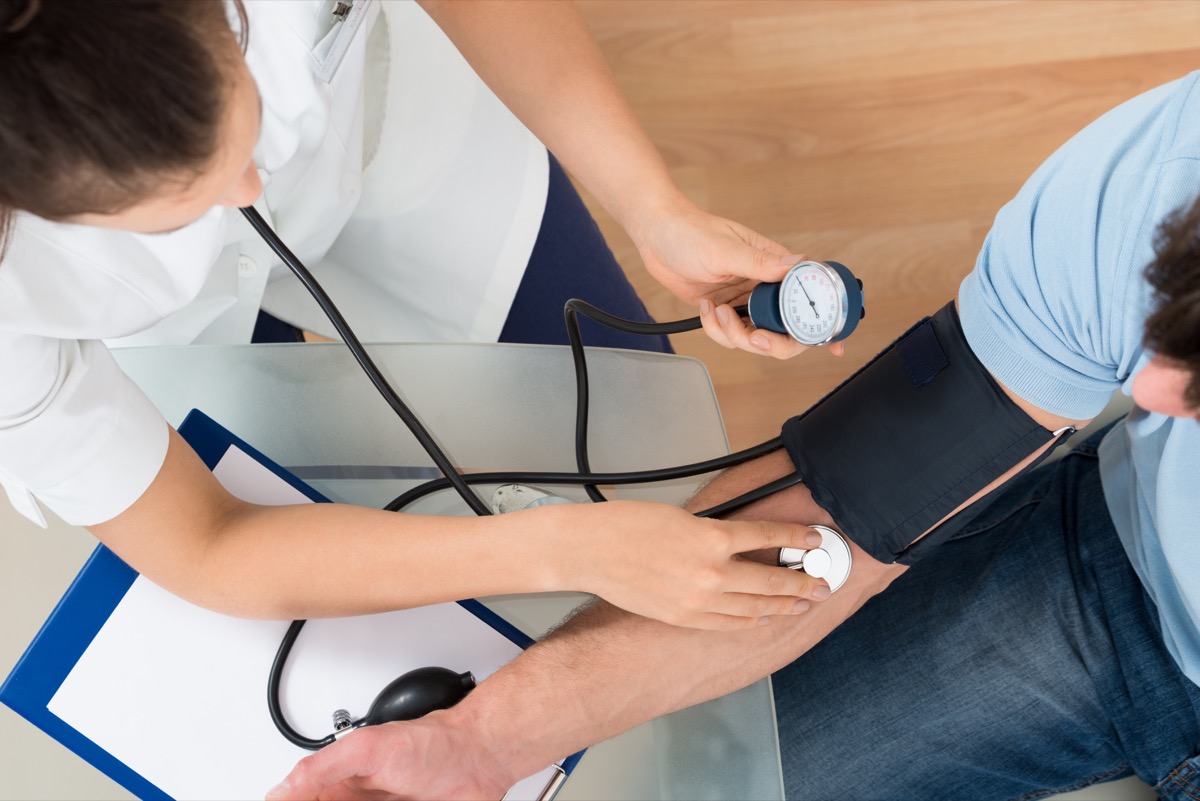It isn’t uncommon to wind down a night with a cocktail in hand and friends all around on the weekend. And most of the time, you don’t have to think twice about this consumption. While drinking alcohol in moderation is generally not a cause for concern (and may have benefits), when your imbibing starts to become a daily habit, Mayo Clinic doctors warn that you might want to take a closer look at how much you drink and how that alcohol can affect your health.
“Occasional beer or wine with dinner, or a drink in the evening, is not a health problem for most people. When drinking becomes a daily activity, though, it may represent progression of your consumption and place you at increased health risks,” Terry Schneekloth, MD, a doctor of psychiatry and addiction at the Mayo Clinic, said in a 2018 Q&A.
Even if it’s just one glass of wine (5 ounces) or beer (12 ounces) or cocktail (1.5 ounces) or hard malt seltzer (8 ounces) every night, in some instances, that’s considered “heavy drinking.”
According to the Mayo Clinic, “Heavy or high-risk drinking is defined as more than three drinks on any day or more than seven drinks a week for women and for men older than age 65 (that’s just one drink a day).” For men under the age of 65, heavy drinking is defined as “more than four drinks on any day or more than 14 drinks a week.”
“Alcohol can damage your body’s organs and lead to various health concerns. For women, this damage happens with lower doses of alcohol, because their bodies have lower water content than men. That’s why the moderate drinking guidelines for women and men are so different,” says Dr. Schneekloth.
Before you pour another drink, you should probably be aware of those common health effects Dr. Schneekloth is referring to. This is why we’ve reviewed all the information the Mayo Clinic provides on the side effects of drinking alcohol every day. If any of these symptoms sound familiar, know that it may be time to cut back on booze. Read on, and for more on healthy eating, don’t miss 11 Amazing Side Effects of Eating a Banana Every Day.


Drinking too much alcohol puts you at risk of several neurological issues, for multiple reasons. For starters, “alcohol is a neurotoxin that can disrupt communications of the brain,” says the Mayo Clinic. “It also affects functions of brain cells directly and indirectly through different organ dysfunction from alcohol usage and vitamin deficiency. Abusing alcohol can lead to seizure, stroke, and dementia, to name a few conditions. Additionally, alcohol is toxic to a developing brain during pregnancy and can cause birth defects, including developmental disorders with lifelong impact.”
For more ways to protect your brain, in addition to reducing your intake of alcohol, you may also want to consider ditching these 3 Drinks That May Be Aging Your Brain Faster.


Alcohol is metabolized by the liver, where an enzyme known as alcohol dehydrogenase (ADH) breaks it down. Because of the burden of processing on this organ, consuming alcohol in excess can result in many liver problems. In addition to increasing your risk of liver cancer, your liver is at risk of other health issues from drinking alcohol in excess every day. Drinking too much “increases your risk of cirrhosis — a serious liver disorder,” says Donald Hensrud, MD, a doctor of Preventive Medicine at the Mayo Clinic.
READ RELATED: ‘I felt I was being assessed on my skin colour’: Black women around the world share their birth stories


“Drinking too much can increase your risk for a host of cancers, including liver, stomach, breast, colon, and oral cancer,” according to Dr. Hensrud.


Alcohol causes the pancreas to produce toxic substances, and as a result, “[drinking too much] raises the likelihood that you could develop inflammation in your pancreas [known as pancreatitis] and in the lining of your stomach,” according to Dr. Hensrud.


“All told, drinking alcohol in excess is the third-leading cause of preventable death in the United States,” says Dr. Hensrud.


“Drinking too much alcohol can raise blood pressure to unhealthy levels,” says Sheldon G. Sheps, MD, emeritus professor of medicine and former chair of the Division of Nephrology and Hypertension in the Department of Medicine at Mayo Clinic. “Having more than three drinks in one sitting temporarily increases your blood pressure, but repeated binge drinking can lead to long-term increases.” Alcohol can also increase your blood pressure through other longer-term measures: “Keep in mind that alcohol contains calories and may contribute to unwanted weight gain — a risk factor for high blood pressure.”


When you drink alcohol every day, you put yourself at risk of developing an addiction. As it relates to alcohol, this addiction is known as alcohol use disorder, “which includes a level that’s sometimes called alcoholism,” explains the Mayo Clinic.
“Alcoholism develops over time as people get into a habit. As tolerance for alcohol increases, consumption often rises as well. You need to be cautious not to fall into bad habits with alcohol, because the consequences can be severe,” says Dr. Hensrud. “I suggest to the people I see in my practice that they go at least a couple of days a week without alcohol, or that they take a break from alcohol for periods of time, as a reality check to make sure they are not becoming dependent on it.”


The Mayo Clinic notes that excessive drinking may lead to heart muscle damage (alcoholic cardiomyopathy) leading to heart failure. Dr. Hensrud adds that “too much alcohol may raise your blood pressure and triglyceride levels. Both can put you at higher risk for heart disease.”
Olivia Tarantino
Source:










